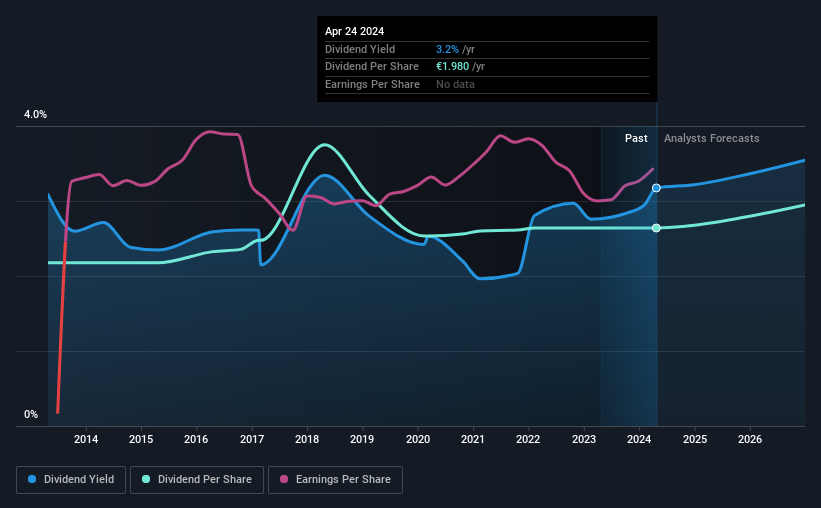Akzo Nobel N.V. (AMS:AKZA) Will Pay A €1.54 Dividend In Three Days
Akzo Nobel N.V. (AMS:AKZA) stock is about to trade ex-dividend in three days. The ex-dividend date is usually set to be one business day before the record date which is the cut-off date on which you must be present on the company's books as a shareholder in order to receive the dividend. The ex-dividend date is important because any transaction on a stock needs to have been settled before the record date in order to be eligible for a dividend. This means that investors who purchase Akzo Nobel's shares on or after the 29th of April will not receive the dividend, which will be paid on the 7th of May.
The company's next dividend payment will be €1.54 per share, on the back of last year when the company paid a total of €1.98 to shareholders. Based on the last year's worth of payments, Akzo Nobel stock has a trailing yield of around 3.2% on the current share price of €62.38. If you buy this business for its dividend, you should have an idea of whether Akzo Nobel's dividend is reliable and sustainable. So we need to investigate whether Akzo Nobel can afford its dividend, and if the dividend could grow.
View our latest analysis for Akzo Nobel
Dividends are usually paid out of company profits, so if a company pays out more than it earned then its dividend is usually at greater risk of being cut. It paid out 76% of its earnings as dividends last year, which is not unreasonable, but limits reinvestment in the business and leaves the dividend vulnerable to a business downturn. It could become a concern if earnings started to decline. Yet cash flows are even more important than profits for assessing a dividend, so we need to see if the company generated enough cash to pay its distribution. Over the last year it paid out 50% of its free cash flow as dividends, within the usual range for most companies.
It's positive to see that Akzo Nobel's dividend is covered by both profits and cash flow, since this is generally a sign that the dividend is sustainable, and a lower payout ratio usually suggests a greater margin of safety before the dividend gets cut.
Click here to see the company's payout ratio, plus analyst estimates of its future dividends.
Have Earnings And Dividends Been Growing?
Stocks in companies that generate sustainable earnings growth often make the best dividend prospects, as it is easier to lift the dividend when earnings are rising. If earnings decline and the company is forced to cut its dividend, investors could watch the value of their investment go up in smoke. Fortunately for readers, Akzo Nobel's earnings per share have been growing at 12% a year for the past five years. The company paid out most of its earnings as dividends over the last year, even though business is booming and earnings per share are growing rapidly. Higher earnings generally bode well for growing dividends, although with seemingly strong growth prospects we'd wonder why management are not reinvesting more in the business.
Many investors will assess a company's dividend performance by evaluating how much the dividend payments have changed over time. Akzo Nobel has delivered 2.0% dividend growth per year on average over the past 10 years. It's good to see both earnings and the dividend have improved - although the former has been rising much quicker than the latter, possibly due to the company reinvesting more of its profits in growth.
To Sum It Up
From a dividend perspective, should investors buy or avoid Akzo Nobel? Higher earnings per share generally lead to higher dividends from dividend-paying stocks over the long run. That's why we're glad to see Akzo Nobel's earnings per share growing, although as we saw, the company is paying out more than half of its earnings and cashflow - 76% and 50% respectively. In summary, while it has some positive characteristics, we're not inclined to race out and buy Akzo Nobel today.
On that note, you'll want to research what risks Akzo Nobel is facing. For example, we've found 2 warning signs for Akzo Nobel (1 doesn't sit too well with us!) that deserve your attention before investing in the shares.
A common investing mistake is buying the first interesting stock you see. Here you can find a full list of high-yield dividend stocks.
Have feedback on this article? Concerned about the content? Get in touch with us directly. Alternatively, email editorial-team (at) simplywallst.com.
This article by Simply Wall St is general in nature. We provide commentary based on historical data and analyst forecasts only using an unbiased methodology and our articles are not intended to be financial advice. It does not constitute a recommendation to buy or sell any stock, and does not take account of your objectives, or your financial situation. We aim to bring you long-term focused analysis driven by fundamental data. Note that our analysis may not factor in the latest price-sensitive company announcements or qualitative material. Simply Wall St has no position in any stocks mentioned.

 Yahoo Finance
Yahoo Finance 
